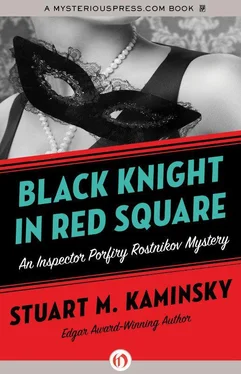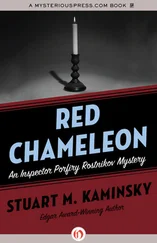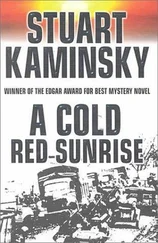Stuart Kaminsky - Black Knight in Red Square
Здесь есть возможность читать онлайн «Stuart Kaminsky - Black Knight in Red Square» весь текст электронной книги совершенно бесплатно (целиком полную версию без сокращений). В некоторых случаях можно слушать аудио, скачать через торрент в формате fb2 и присутствует краткое содержание. Год выпуска: 1983, ISBN: 1983, Издательство: Fawcett, Жанр: Полицейский детектив, на английском языке. Описание произведения, (предисловие) а так же отзывы посетителей доступны на портале библиотеки ЛибКат.
- Название:Black Knight in Red Square
- Автор:
- Издательство:Fawcett
- Жанр:
- Год:1983
- ISBN:9780804104050
- Рейтинг книги:5 / 5. Голосов: 1
-
Избранное:Добавить в избранное
- Отзывы:
-
Ваша оценка:
- 100
- 1
- 2
- 3
- 4
- 5
Black Knight in Red Square: краткое содержание, описание и аннотация
Предлагаем к чтению аннотацию, описание, краткое содержание или предисловие (зависит от того, что написал сам автор книги «Black Knight in Red Square»). Если вы не нашли необходимую информацию о книге — напишите в комментариях, мы постараемся отыскать её.
Black Knight in Red Square — читать онлайн бесплатно полную книгу (весь текст) целиком
Ниже представлен текст книги, разбитый по страницам. Система сохранения места последней прочитанной страницы, позволяет с удобством читать онлайн бесплатно книгу «Black Knight in Red Square», без необходимости каждый раз заново искать на чём Вы остановились. Поставьте закладку, и сможете в любой момент перейти на страницу, на которой закончили чтение.
Интервал:
Закладка:
“ ‘Choose one,’ ” Rostnikov groaned. He looked at Karpo who remained calm.
In addition to the ache in his arm, Karpo felt a migraine coming on. He should excuse himself and take a pill, but he knew he would not do so. He would work through the pain, welcome it even, and prove that he could function in spite of the weakness of the flesh.
“She means to bomb one of these theaters,” said Karpo, “or release a gas inside it or shoot a great many people.”
Rostnikov nodded in agreement. It was logical, but something disturbed him. “She is so smart, so careful, so clever,” he said, looking at his two assistants, “and yet she leaves this. Can you account for it?”
“She mocks us,” said Karpo. “She is confident that she will succeed and we will fail. It is her pride.”
“Maybe she simply made a mistake,” said Tkach. “She didn’t know we would find her room, and she simply didn’t have time to clear it out.”
“And maybe,” sighed Rostnikov, “she wishes to be caught.”
His eyes went to the two men, but neither responded. Tkach squirmed slightly. Such psychological conjecture was officially frowned upon, but Porfiry Petrovich was given to such thinking and marveled at the twists and turns and the devious self-destructiveness of the human mind.
“She wants to succeed, as Emil says, and fail at the same time,” Rostnikov mused.
“Then she is mad,” said Tkach.
“No,” said Rostnikov, “she is human. Let us hope that we are quick enough and clever enough to take advantage of her perverse desire to be caught before her will to succeed does indeed result in her success.”
“That will not happen,” Karpo said, with such conviction that the other two stared at him. There had been more emotion in that response than either of them had ever heard from Karpo.
The ringing of the phone interrupted the moment, and Rostnikov picked it up.
“We are most busy,” he told the officer taking calls.
“It is Colonel Drozhkin,” the young man answered.
Rostnikov sighed. “Put him through.”
He looked across the desk at Karpo and Tkach and made a decision. He reached into a drawer, pulled out a tiny tape recorder, and attached a small suction cup to the receiver, under the curious eyes of the other men. Then he turned on the unit and took the call.
“Inspector,” came Drozhkin’s serpentine voice. He spoke slowly and evenly and with more than the hint of threat.
“Yes, Colonel,” Rostnikov replied calmly.
“One of your people violated security this morning,” said the colonel. “An Inspector Emil Karpo.”
“He is here in the office with me,” said Rostnikov.
Tkach, not knowing whom the call was from or about, looked up, trying to control the ever present below-the-surface fear of the unseen authority. Karpo gave no reaction.
“We have reason to believe that he discovered something vital to the investigation of World Liberation activities and potential terrorism,” said Drozhkin.
Drozhkin was not letting on whether the KGB had found the numbers and made its way to the apartment, and Rostnikov would be most careful not to give any information away.
“He was following my orders, Colonel,” said Rostnikov. “He found nothing of great importance. Your men did not give him time to search. Had he discovered anything, we would have informed you immediately.”
It was clear now to Karpo who the subject of the conversation was, but it was not clear to him why Rostnikov was lying to the KGB. Rostnikov was far too clever to be caught in a lie, and yet here he was taking a chance that could endanger his career.
Drozhkin’s pause lasted so long that Rostnikov thought he had hung up quietly or the connection had been broken.
“You are treading down a dangerous path, Inspector,” he said finally.
“It is the nature of existence to recognize and face random disaster that might come our way,” said Rostnikov. “We are but the servants of the state and must not let our individuality stand in the way of the good of the Soviet people.”
“Irony is a dangerous weapon,” hissed Drozhkin. “It has no handle. You hold it by the blade, and with one slip you can become its victim.”
“Irony is based on an understanding between two people,” Rostnikov countered, bewildering Tkach, who could not imagine the other end of this bizarre conversation. “If someone perceives irony, he does so on the assumption that the person presenting that irony intended it to be so read. For myself, Comrade Colonel, I lack the wit and education to indulge in irony.”
“When this investigation is at an end, Comrade Inspector, you and I shall have a talk.” There was no mistaking the threat now, but that was just what Rostnikov wanted.
“I always look forward to meeting with you, Comrade Colonel,” he said.
“You have made progress on the case?” Drozhkin went on.
“A little,” admitted Rostnikov.
“For your sake, let us hope you make a great deal of progress. There can be only one or two World Liberation members left in Moscow, and they are your murderers,” said Drozhkin.
“Yes,” agreed Rostnikov. “That seems likely. I will keep you informed, Colonel.”
They hung up, and Rostnikov turned off the tape recorder and dropped the tape into his pocket. Then he took the second sheet of paper from the folder Karpo had brought. It was another map of Moscow, and it needed no interpretation. The names of national monuments were circled, and the tomb of Lenin in the heart of Red Square was clearly marked.
“In time, I will turn these maps over to Colonel Drozhkin of the KGB,” Rostnikov said. “He will, I hope, provide guards for every location circled on both maps. Meanwhile, Tkach, you will be responsible for watching the Englishman, Willery. I will stay with the German, and you, Karpo, will continue your pursuit of this woman. Thanks to the KGB, she has been deprived of her terrorist connections. She has resorted to recruiting amateurs, and they are, as we know, most unpredictable. Tkach, you can work with Kirslov in shifts. Questions?”
Both Karpo and Tkach had many questions, but neither dared ask them. They got up and left the office quietly. When they were gone, Rostnikov pulled out the tape and looked at it, thinking a moment, then returned it to his pocket and got up. He had to move quickly.
On the sixth floor, he made copies of the two maps. He then walked directly to the office of Anna Timofeyeva. If someone stopped him, he would say that the procurator had asked him to get some papers from her office and bring them to her at the hospital, which was true. No one stopped him. A clerk pushing a cartful of folders ignored him. It took him only a few minutes, with the portrait of Lenin staring down at him from behind Anna Timofeyeva’s desk to get what he wanted and leave. If someone stopped and searched him now, he would be hard put to find an explanation, but he had already worked out a story that might stand up. However, there was very little chance that a chief inspector would be questioned inside Petrovka.
He was back in his office within three minutes and out the front door only shortly after that, his worn briefcase bumping against his thigh. By now Drozhkin most certainly had someone watching him. That didn’t matter. When the time came, he would lose the follower, but it wasn’t time yet. The Volga was waiting at the curb. The driver was unfamiliar, and Rostnikov decided he was probably KGB, though he wore a police uniform.
He ordered the driver to wait outside Procurator Timofeyeva’s apartment, got out of the car, and went into the building carrying his briefcase.
In spite of her high position, Anna Timofeyeva lived in a small one-room apartment in an old one-story concrete building that had originally been built as a barracks for an artillery unit. When the site was abandoned after ground-to-air missiles were developed, the barracks on the Moskva River were converted into small apartments with a communal kitchen that had once served the unit stationed within its walls.
Читать дальшеИнтервал:
Закладка:
Похожие книги на «Black Knight in Red Square»
Представляем Вашему вниманию похожие книги на «Black Knight in Red Square» списком для выбора. Мы отобрали схожую по названию и смыслу литературу в надежде предоставить читателям больше вариантов отыскать новые, интересные, ещё непрочитанные произведения.
Обсуждение, отзывы о книге «Black Knight in Red Square» и просто собственные мнения читателей. Оставьте ваши комментарии, напишите, что Вы думаете о произведении, его смысле или главных героях. Укажите что конкретно понравилось, а что нет, и почему Вы так считаете.












